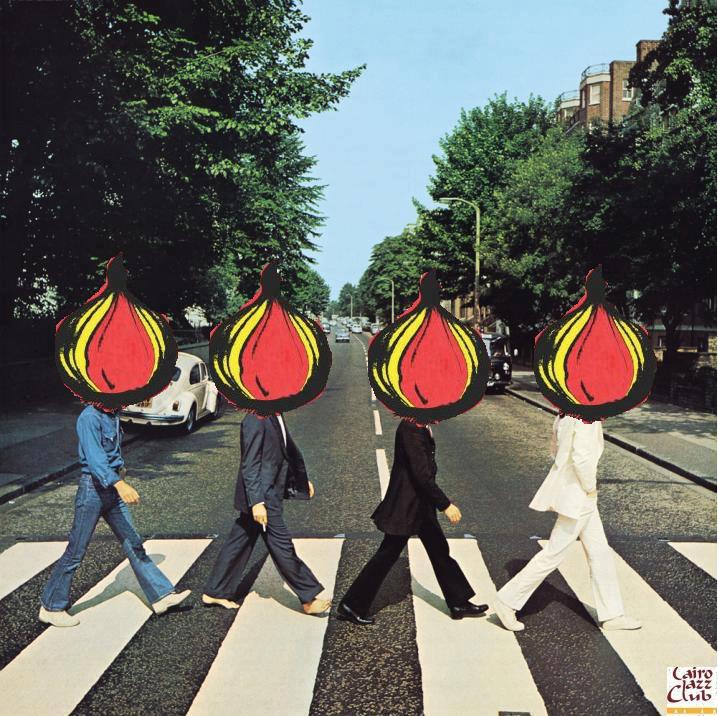
Any disaster movie worth its body count needs an alarming score to complement the onscreen carnage and convince audiences that the end is not only near, it’s also as inescapable as it is expensive-looking. And when it comes, sometimes it sounds epic, sometimes it sounds terrifying, and sometimes it sounds like Aerosmith, which is also terrifying. But what about real-world disasters? What about the sounds not inspired by target demographics, but by genuine conflict, chaos, and loss?
Machine Eat Man’s fifth album “Mafeesh Gideed ya Balad al-Taqleed” (“Nothing New, Copycat Country”) — launched on Monday at the Cairo Jazz Club — isn’t the soundtrack to a disaster movie, but it certainly feels like one, mostly due to the themes running through it. As one sample urgently declares a few seconds into the opening track, the inspiration here comes largely from the “news room” — a hive of worrying developments, causes for concern and endless indications of impending doom. Combined with a plodding bassline and an ominous, swelling electro-brass siren, intentions are made immediately clear — “Mafeesh Gideed” is the soundtrack to a world in collapse. More specifically, it’s a soundtrack to now.
Across all art mediums, there is no genre more suitable for depicting the highs and lows of a technology-dependent world than electronic music. Mohamed Ragab’s stage name alone makes it clear which of the two he’s interested in. Predictably, “Mafeesh Gideed” shares much in common with the work of other young Egyptian electronic musicians, such as Bikya and Maurice Louca. But while Ragab’s vision might not be as bleak as the leisurely tour of the apocalypse of Louca’s album “Garraya,” it is more urgent sounding — more reactionary, even if the reaction seems limited to “panic.” Essentially, “Mafeesh Gideed” is nine increasingly violent panic attacks, each punctuated by 10 seconds of silence, presumably as a recovery period.
After setting the tone with its sirens and sampled news broadcasts, opener “Oghneyit al-Mousim” (“Song of the Season”) builds into a tabla-assisted slapdown, fueled by thudding beats and spiraling synths. It’s commanding, it’s menacing, it’s relentless. It’s also pretty typical of the rest of the album. Given the name, it’s unsurprising that variety isn’t a huge theme in “Mafeesh Gideed,” but Ragab doesn’t build on repetition, either, at least not in an effective way. When things get repetitive, it’s just that, as opposed to being, say, hypnotic. Ultimately, “Mafeesh Gideed” works better as a whole, single work than it does as a series of individual tracks, and taken as a whole, it works very well, though at times it can feel like being beaten up by a gang of robots at a construction site. But that’s not necessarily a bad thing.
When variety does come, it’s worth the wait. Of the album’s few stand-out tracks, “Sayataghayar al-Kalam” (“Words Will Change”) is the strongest, chugging along on the back of a grimly compulsive beat, like being made to dance into the heart of darkness. It’s simultaneously anarchic, pessimistic, celebratory and completely pagan. The instruments all sound player-less and possessed, synths gurgle demonically, a theremin wails out lines that move like a phantom belly-dancer, and in the breaks between the clutter an excited man shouts cheerfully over a long-distance phone line: “I miss Egypt! Say hi to Egypt for me!” If this reviewer had his way, “Sayataghayar al-Kalam” would be immediately announced as the official anthem of the ongoing revolution(s).
With “Mafeesh Gideed,” Ragab has pulled off something significant. By incorporating samples that ground his album in an immediate socio-political context, Ragab has taken a considerable risk. Music inspired by local injustice and civil unrest tends to be awful, if only because an acoustic guitar doesn’t make whining or preaching any less annoying, nor do sampled chants and militaristic drumbeats. Thankfully, “Mafeesh Gideed” steers clear of those particular clichés. Ragab doesn’t seem to be as interested in making protest music as he is in capturing the sound of protest, and what he’s captured as a whole sounds appropriately unsettling as it progresses throughout its various phases — enraged and spitting, wrung-necked and wheezing, muffled through a clenched fist, exhausted, betrayed, defeated.
There are some drawbacks: a few of the compositions feel a little too structured, and toward the end of the album the frequent tabla samples begin to distract, jarring with the harsher electronics — a problem that, to a lesser extent, affects the effort as a whole. Despite its uncomplicated production, and Ragab’s obvious attempts at making a growling beast of a record, “Mafeesh Gideed” could have benefited from lower production values — scuzzier basslines, grimier beats, choppier guitars, static, distortion. Ragab aptly conveys the flames and the masses, but falls short of the shrapnel and glass lodged in your skin, the blood on the sidewalk, the pain, anger and resentment that linger once the streets have been emptied. At times, it feels like the only thing keeping the album from making its point is its self-restraint. It’s too worried about being polite, its adherence to a relatively traditional framework, when instead it should be focused on making your ears bleed. With “Mafeesh Gideed,” Ragab bears witness to the collapse from a safe distance — hopefully his next effort will find him on the street, armed to the teeth.




